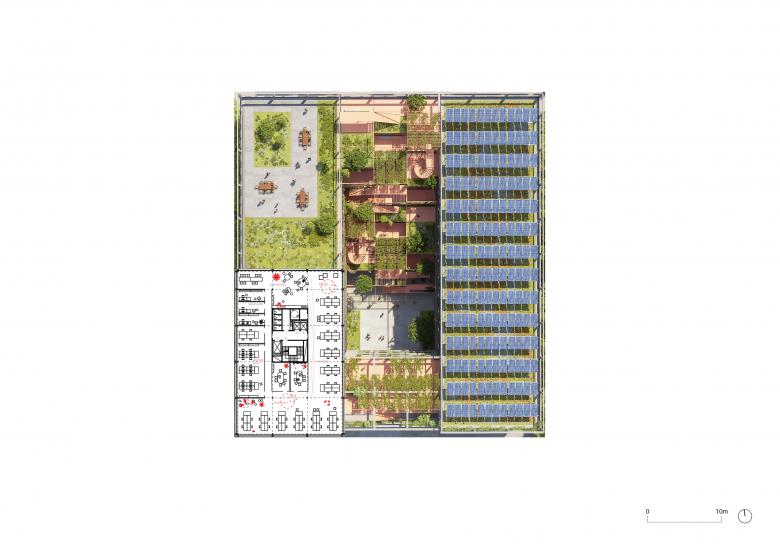Vertical Farmhouse
Behrens-Ufer, a former industrial site located in the southeast of Berlin, will be undergoing transformation into a new urban technology hub over the next few years. On the banks of River Spree, research, development, and production will be combined in listed historical buildings and sustainably designed new additions. In the eastern part of the site, the Vertical Farmhouse designed by HENN will be constructed as a hybrid building featuring an innovative working and research environment with a fruit garden in its center.
The new build comprises two blocks that enclose an ascending terraced rooftop garden, which creates a network of paths through the entire complex, extending all the way from the riverside promenade to the rooftop gardens. Below the gardenscape is a 9,000 square meter vertical farm for food production in synergy with a fish farm. Inspired by coastal agricultural landscapes, the rooftop garden is designed as a playful orchard with light extensions and overgrown pergolas inviting visitors to pick berries and fruit from trees. It serves as a place for outdoor communication, inspiration, and recreation for those who work in the building or visit the gardens.
The pergolas mediate between platforms situated at different heights while interlinking the outdoor space with the work environments and laboratory areas located in the external building wings in a variety of ways. Thanks to the clearly structured grid, the wings can be divided and used in a flexible manner, which allows for a wide range of uses in the future. A bridge connects the two blocks to the riverbank. It accommodates co-working spaces and offers views across the River Spree and into the orchard. Meeting rooms incorporated into the garden terraces provide views of the vertical farm. Lettuce and herbs are grown in this structure reaching a height of up to nine meters, some of them in a fully automated setup. The aquaponics process establishes a natural cycle that uses nitrate-rich water from fish farming as fertilizer for growing plants.
In contrast to their lush natural surroundings, the building blocks are designed as clear, calm cubes. Its staggered levels allow the new build to blend harmoniously into its environs. The hybrid-timber structure uses a low-tech approach that minimizes resource and energy consumption. The façade combines large glass windows with photovoltaic panels for power generation. At ground-floor level, the building features arcades that open to the riverside promenade, inviting passersby to stroll through the Behrens Gardens.
Beehives will be placed on the rooftops alongside the agrivoltaic systems that allow the areas to be used for both agricultural production and electricity generation. Synergies from the vertical farm also contribute to the holistic sustainability concept.
As a new building block embedded in a newly designed urban neighborhood, the Vertical Farmhouse will serve as a model project on an international scale. Technology, nature, and agriculture merge into a holistic experience – right in the middle of the city.
- Year
- 2024
- Client
- DIEAG
- Team
- Daniel Festag, Martin Henn, Gianmarco Fabbri, Oliver Koch, Julia Menz, Armin Nemati, Andre Serpa, Pengyan Wu, Yanan Yuan
- Landscape architecture
- Aplantis
- Structural engineer
- GRBV Ingenieure
- Building services
- Winter Ingenieure
- Fire protection
- Nees Ingenieure












